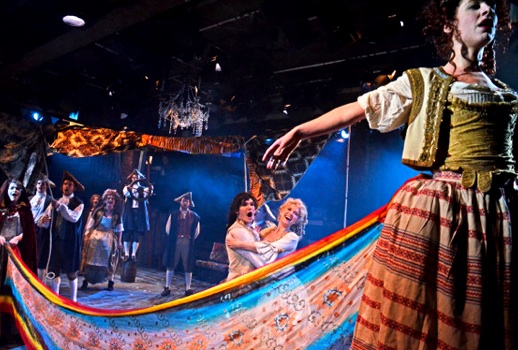

Candide has undergone numerous revisions since its premiere in 1956, and the show has been presented in a broad array of formats. My first exposure to the piece was a semi-staged production featuring the New York Philharmonic conducted by Bernstein protégée Marin Alsop and Broadway luminaries Kristin Chenoweth and Patti LuPone. In that 2004 staging, it was Bernstein’s exciting music—including the well-known “Glitter And Be Gay” with its daring coloratura – that left a strong impression on me.
Matthew White‘s Menier production offers a more intimate experience—performed in the round (or, actually, a rectangle) with the actors darting through and around the audience—and presents the piece more as period circus than philosophical meander. The fundamental questions raised by Voltaire—how can we understand the existence of suffering and conflict if this is the “best of all possible worlds”—are subordinate to entertainment value.
We meet Candide, played with youthful ardor by Fra Fee, as he anticipates his new life in “the best of all possible worlds” as husband to Cunegonde (Scarlett Strallen). However, after the Bulgar Army launches an attack on Westphalia, Candide confronts death, destruction, and disease, and struggles to reconcile the optimism of his teacher, Dr. Pangloss (James Dreyfus), with the heinous events unfolding around him. The characters separate and reunite in Paris, Buenos Aires, and Vienna. With over half a dozen contributors to the book and lyrics over the years, including Stephen Sondheim, no one should be surprised by the intractability of the plot.
Nevertheless, Candide has acquired a loyal following, and, like much of Bernstein’s work, is at its best when collaboration is nurtured between artists from the worlds of musical theatre and opera. The Menier production offers London audiences a rare chance to hear Bernstein’s eclectic score, which melds the fleetness of Strauss with the rhythms of Latin American dance music. Arias, duets, and ensembles are all delivered with energy and sensitivity by the young cast of 15, and Adam Cooper‘s choreography is executed with finesse. Strallen sings with purity and (measured) abandon as she tackles Cunegonde’s stratospheric tessitura. Fee is best when he wrestles with Voltaire’s teachings in contemplative, plaintive arias like “It Must Be So.”
Unfortunate musical omissions include the duet “We Are Women,” which came off as a fiery diva contest when Chenoweth and LuPone shared the stage. Yet with a running time of over two and a half hours, such cuts are probably wise.
While Music Director Seann Alderking and his nine musicians work very hard, they simply lack the orchestral muscle needed to conjure all of the colours and intricacies that make Bernstein’s score so memorable. Nowhere was this more apparent than the Overture, one of the composer’s most performed works. But there are several recordings that offer all of the musical bells and whistles, including a starry 1989 version conducted by Bernstein himself. For a live experience, meanwhile, the Menier Chocolate Factory production is unparalleled.
While this Candide (running until February 22, with many performances sold out) is unlikely to transfer to the West End, the entire company deserves praise for finding exuberance in a notoriously tricky show.

























Comments